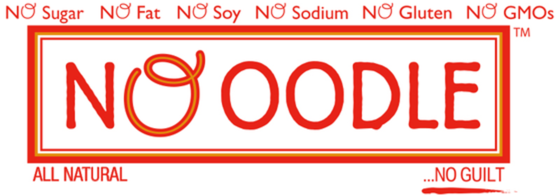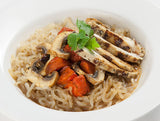NOoodle FAQ
NOoodle Frequently Asked Questions
FAQ
At NOoodle we love to answer questions about our product! Thank you for taking the time to ask. If the answer to your specific question is not found on the NOoodle FAQ page, please send an email to jake@nooodle.com and we will get back to you as soon as possible.
Konjac glucomannan (KGM) is a water-soluble dietary fiber derived from the root of the Konjac plant. NOoodle, also called Shirataki Noodles in Japan, are made from Konjac Glucomannan and has a culinary history spanning over two thousand years in Asia. Referred to as Moyu or Juruo in China, and Konnyaku or Shirataki Noodles in Japan, these noodles are a popular health food in the Asian markets. The NOoodle Company is now manufacturing and marketing the highest quality noodles made from KGM in North America.
The NOoodle....
-
is naturally water soluble fiber with no fat, sugar, starch, gluten, soy or protein.
-
contains zero net carbohydrates and zero calories.
-
is wheat and gluten free.
-
pure Vegetable
-
can be stored in the room temperature for one year. It does not need refrigeration
-
is translucent and gelatinous, with no flavor of its own - it easily absorbs the dominant flavors of any soup or dish.
-
is ready to serve
-
instant pasta for a quick meal
Konjac Glucomannan is the most viscosity soluble fiber in nature - it forms an extremely viscous solution.
Konjac Glucomannan has the highest molecular weight of any dietary fiber known to science - molecular weight is between 200,000-2,000,000 Daltons.Konjac Glucomannan has the highest water holding capacity of any soluble fiber - up to 100 times its own water weight.
Frequently Asked Questions:
Are there pasta and noodles without calories?
As we all know, pasta and noodles are made of starch, and so they have calories. But there is an exception: The NOoodle is made entirely without calories. The NOoodle is made from Konjac fiber and water. As you are most probably aware, dietary fiber and water have no calories, thus The NOoodle is entirely devoid of calories. The NOoodle is the healthy alternative to pasta.
Why is the NOoodle so healthy?
The answer to this questions lies in understanding the role of fiber in our diets. Our noodle is made mainly of soluble fiber. Soluble fiber acts to slow digestion. By doing this, it allows for the slower absorption of glucose and is the reason behind its beneficial effects in diabetes. Those with heart disease, type 2 Diabetes, and obesity will benefit from increasing soluble fiber in their diet, as the American Dietetic Association recommends that people consume 20~35 g of fiber per day, of which 5~10 g should be soluble fiber.
The soluble fiber found in the NOoodle slows digestion and prolongs the sensation of fullness and is an essential part of any weight loss program.
You also absorb more nutrients in the foods you eat with The NOoodle due to the slowing of digestion.
How can the NOoodle help me with my weight loss goals?
Just by replacing one meal per day with our noodles will significantly raise your needed fiber intake and dramatically lower your total calorie intake. The human body uses more calories to break down high-fiber foods. The NOoodle is pure fiber without proteins, fats, sugars or starch. In short it has zero calories. In combination with raising your metabolic rate with moderate exercise, you have just found the tasty weight loss plan you have been looking for. It's possible to lose weight and feel satisfied when you eat food combined with the zero calories NOoodle. The key is eating foods that are high in volume and relatively low in calories. The NOoodle has zero calories but large volume, which helps you feel full but without adding extra calories. The key concept here is energy density; low-energy density foods are high volume.
Energy density of foods refers to the ratio of the foods calories to the volume of the food. High- energy density foods, such as desserts and candies, have small volume but more calories. Low- energy density foods, such as vegetables and fruits, have large volume but fewer calories.
Low calorie foods such as the NOoodle can help you feel satisfied with fewer calories. By consuming fewer calories, you can lose weight over time and keep it off for longer time.
Can the soluble fiber in The NOoodle help my cholesterol?
Yes! Soluble fiber binds bile acids that are secreted from the gall bladder. These bile acids have cholesterol in them and are bound up by the soluble fiber in the NOoodle and then excreted. See the 3rd study on the left for specific documentation.
How does The NOoodle help Type II Diabetes?
By slowing the digestive process, there is a slower absorption of glucose which then requires a slower release of insulin from the pancreas which aids in the normalization of blood glucose after eating a meal
Can it be used in gluten-free, casein-free or soy-free diets?
The NOoodle contains no gluten, casein or soy so can be used as the base ingredient for diets that cannot contain these ingredients.
Food Regulatory Status of Konjac Glucomannan
FDA approved as Generally Recognized As Safe (GRAS) in the United States Health Canada approved as a food ingredient in Canada
Konjac Glucomannan powder be affirmed as GRAS for use as a food ingredient Listed on FCC (Food chemical codex), the 4th edition 1996 USA
Approved by the EU # L295127, E-425
Listed under E425, Annex V, food additives, 1998, EU
Glucomannan Related Medical Research Diabetes
Konjac-Mannan and American ginsing: emerging alternative therapies for type 2 diabetes mellitus.
Long-term effects of dietary fiber supplementation on serum glucose and lipoprotein levels in diabetic rats fed a high cholesterol diet.
Dietary fiber in the dietetic therapy of diabetes mellitus. Experimental data with purified glucomannans
Beneficial effects of viscous dietary fiber from Konjac-mannan in subjects with the insulin resistance syndrome: results of a controlled metabolic trial. {pdf format}
Effect of Konjac food on blood glucose level in patients with diabetes.
Effects of long-term high-fiber diet on macrovascular changes and lipid and glucose levels in STZ-induced diabetic SD rats.
Cholesterol
Effect of short-term ingestion of konjac glucomannan on serum cholesterol in healthy men.
Cholesterol reduction by glucomannan and chitosan is mediated by changes in cholesterol absorption and bile acid and fat excretion in rats.
Comparison between physiological effects of konjac-glucomannan and propionate in baboons fed "Western" diets.
Low levels of viscous hydrocolloids lower plasma cholesterol in rats primarily by impairing cholesterol absorption.
Antisteatotic effects of four kinds of dietary fibers in rats fed on high cholesterol diet: a preliminary morphometric analysis
Effects of dietary konjac mannan on serum and liver cholesterol levels and biliary bile acid composition in hamsters.
Influences of refined konjac meal on the levels of tissue lipids and the absorption of four minerals in rats.
Obesity
Evaluation of the action of glucomannan on metabolic parameters and on the sensation of
satiation in overweight and obese patients
Childhood obesity treatment: double blinded trial on dietary fibres (glucomannan) versus placebo.
The use of highly purified glucomannan-based fibers in childhood obesity Chronic use of glucomannan in the dietary treatment of severe obesity Effect of glucomannan on obese patients: a clinical study.
Constipation
Effect of the dietary fiber glucomannan on chronic constipation in neurologically impaired children.
A clinical study of the use of a combination of glucomannan with lactulose in the constipation of pregnancy
Action of glucomannans on complaints in patients affected with chronic constipation: a multicentric clinical evaluation.
Mouth-to-cecum transit time in patients affected by chronic constipation: effect of glucomannan.
Colonic pathology
Purification and characterization of konjac glucomannan degrading enzyme from anaerobic human intestinal bacterium, Clostridium butyricum-Clostridium beijerinckii group.
Efficacy of rifaximin in the treatment of symptomatic diverticular disease of the colon. A multicentre double-blind placebo-controlled trial.
Use of glucomannan dietary fiber in changes in intestinal habit
Efficacy of rifaximin on symptoms of uncomplicated diverticular disease of the colon. A pilot multicentre open trial. Diverticular Disease Study Group.
Others
Glucomannan prevents postprandial hypoglycaemia in patients with previous gastric surgery.
Dietary fiber and OGTT: blood sugar variations after administration of a new purified
glucomannane
Long-term animal feeding trial of the refined konjac meal. II. Effects of the refined konjac meal on the aging of the brain, liver, and cardiovascular tissue cells in rats.
Inhibitory effect of refined Amorphophallus konjac on MNNG-induced lung cancers in mice
Immunologic clinical evaluation of a biological response modifier, AM3, in the treatment of childhood infectious respiratory pathology






